
A few people have been emailing me about my experience doing my pastry internship (also known as an externship, stage, stagiere, or apprenticeship). How did I decide to do it? How did I ask? How did I find what places were accepting internship applicants? These are all good questions and I am going to do my best to address them through my own experiences and opinions on the subject. I hope that, regardless if you are a cooking student or not, this will help you in your quest of finding an internship that best suits you.
How did you decide to do an internship?
For a long time the only thing I knew how to bake were chocolate chip cookies. It was only after I graduated college that I suddenly, and quite unintentionally, had any interest in baking anything else. Once I started, I began to read up more on the subject and poring through cookbooks. I started at simply making cupcakes, but I soon moved up to ice creams, custards, layer cakes. After a year or two I was throwing together puff pastry, breads, and laminate doughs. At my day job I spent my down time reading baking blogs, cookbooks, and jotting down ratios and recipes on scraps of papers and in numerous little notebooks. I was like a student cramming for exams, attempting to memorize every fact and understand each equation.
I would take the occasional cooking class to boost my knowledge, and various writing assignments allowed me to work alongside talented pastry cooks who would teach me what I wanted to know. From here I was able to understand and practice advanced skills in a more conducive environment. I knew that I didn’t want to go to pastry school as I was (and still am) currently enrolled for my Master’s degree. The thought of being the opening victim in a Saw film seemed more appealing than spending more time in class and, god almighty, accumulating more student loan debt. Furthermore, conversations with many chefs and caterers had convinced me that the best way to learn was to be in a kitchen working.
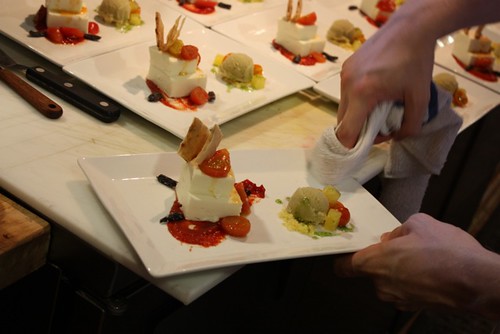
I became determined to find a kitchen that would take me in for a while and let me work and learn under a master who knew the craft. I felt that, for me, this was the most logical way to get a lot of hands-on experience in a number of aspects of the field. At the same time I would get the chance to better understand a subject and career field that, as a food writer and outsider, I had often written about but never fully understood. I felt that this experience would not only make me a better baker, but a better writer as well. Lastly, I still wanted to be a college writing professor in the future. In my opinion, the best teachers were the ones who had left academia to have adventures. These teachers usually had a broader, more comprehensive worldview that seemed to grant them more sagely understanding of their subject and students.
For me, it seemed that an internship was necessary in all aspects of my life.
What did you have to consider beforehand?
The decision to do an internship wasn’t an idea I just decided on a whim, like shooting an arrow blindfolded and assuming it would find its target. I held onto the idea tightly, sitting down and figuring out a lot of problems and questions that I knew were bound to come up. How would I get the time off from work? How much time would I need? How much time could I get? What kind of supplies would I need? What goals and skills did I desperately want to master in my time there? Who did I want to work with? What is my financial situation and how will it be affected?
This was the hardest part of figuring out my internship.
To begin, I had to find someone who would take me on (a topic I will discuss in detail shortly). Next, I sycophantically approached the Human Resources coordinator at my work and questioned what the policy on taking extended leaves and vacation might be. While I had a considerable amount of vacation time built up at my job – about three months worth – I didn’t want to cash it all in as 1) there might be the chance that my employers wouldn’t be too keen on my taking such a leave, 2) the amount or work I would return to after that long would likely drive me insane, and 3) I wanted to have some vacation time for other plans such as visiting family.
Luckily, working for a non-profit, my employer was more than happy to give me permission to encourage personal growth and recharge my batteries. We worked out that I would be permitted to take five weeks off; three of them as vacation and two of them as leave. The two weeks of leave would be unpaid.

Money is a serious aspect of the internship you need to take into consideration. As an intern you will not be paid. If you’re already a student then this might not be a change from your current situation. If you’re working a normal 40-hour work week then understand that either you’ll be cashing out your vacation or possibly going without a paycheck for a while. If this is the case then you need to be sure to budget ahead.
All of this took place in May, and the internship was planned for September. This gave me enough time to get all financial matters in order. I ensured that I had saved enough money to not have to worry during those two weeks. Afterwards, I called the restaurant I planned to work at and set the date I would work. I then conferred that to the Human Resources coordinator at my job and confirmed everything.
Money-wise, you also have to take into consideration other costs. Think about extraneous, though necessary, purchases. As an intern you may be provided with some chef’s whites, though at some places you may not. If you aren’t in cooking school and don’t already have equipment then you will need to purchase it. This can include non-slip shoes, pants, knives, a knife roll, and many other pieces of equipment. If you’re planning to bake then the number of tools you will be expected to have can be staggering. In fact, you will probably need to buy a tool box to carry them all. Though you may have some of these tools already you should expect to spend anywhere from $100-$350 on equipment for your internship. I made sure in the months beforehand to search and purchase quality tools that would serve me well not only during the internship, but afterwards as well. (I bought a lot of it through the Amazon stores of fellow bloggers so as to throw some cash their way.) Try not to be cheap on these external costs as your tools are your trade. Shitty tools result in shitty results.

Aside from money, I had to consider the actual workload. For me this would be a shift from a sedentary job in an office to standing for six to ten hours at a time working with my hands, at times doing repetitive tasks for hours on end. Are you not okay cutting and de-seeding grapes for three hours? Chopping up an entire flat of figs? Peeling, buffing, coring, poaching, and slicing a sheer rock slide of Seckel pears? You better be. Expect your feet to get sore and your body to hurt. Expect burns and cuts far worse than what you have experienced at home. It will take a while for your body to adjust to the physical demands of the job. I knew to expect this but once you are actually there the fatigue that sets in is much worse than you expect it to be. You need to be prepared to tough it out.
If you have any particular physical ailments then you need to take a step back and critically analyze how it will affect your performance. If you suffer from chronic fatigue, back pain, or don’t have the ability to stand for more than an hour at a time, then you shouldn’t be looking for an internship. You will simply act as a determent in the kitchen, slow down service, and impede your co-workers from getting their own work done. This may sound harsh, but it is the truth.
Lastly, as I previously noted, I only worked five weeks. That was the longest amount of time I could get from work, which for me was the deciding factor. Some restaurants only offer one or two week internships, and others will let you work for three or more months. I wish I could have done three months but it wasn't a feasible option when I considered my position. To make up for it I made sure to work a ridiculous number of hours each week. Though this was exhausting, I revelled in it. The notebook I brought with me everyday to record events of the day, techniques, numbers, names, recipes, and other important info proves it as I nearly filled the entire thing in the space of a month. Remember that the more time you can spend in the kitchen the better.
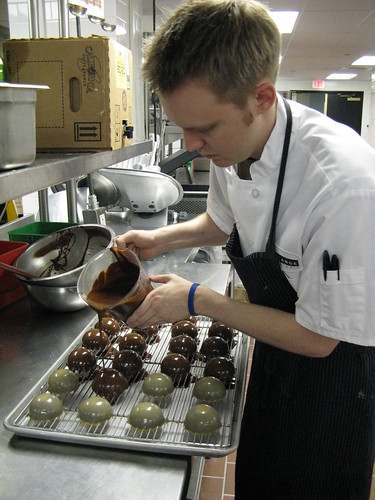
How did you find a chef to work under?
I was really lucky finding Elaine, my mentor and the pastry chef at Grange. She happily took me on and was more than willing to teach me. She demonstrated the commitment and drive needed to live in the business, often working sixteen hour days and constantly striving to create diverse and engaging recipes that would entice clients. She functioned with an ethos that I wanted to emulate: she created high-end desserts using solid techniques (both classic and modern) and utilizing seasonal ingredients. I knew this because I spent months looking at her menus and going to the restaurant and trying her desserts, seeing what I liked and didn’t like and if this was what I wanted to learn.
If you are serious about doing an internship you first need to know what it is you want to learn. I jotted down on a list various ideas, goals, techniques and concepts I wanted to be sure I could observe in a kitchen. Next, I began to profile the best possible restaurants that had pastry chefs that embodied my list and started researching both the pastry chefs and the restaurants. For me, I was able to do this second-hand via a magazine article I was working on. In it I profiled all the chefs I was interested in while at the same time observing and listening to their theories on what constitutes good pastry. After collecting a lot of information, visiting the restaurants, trying the food, and some heavy deliberation there was only one obvious choice.
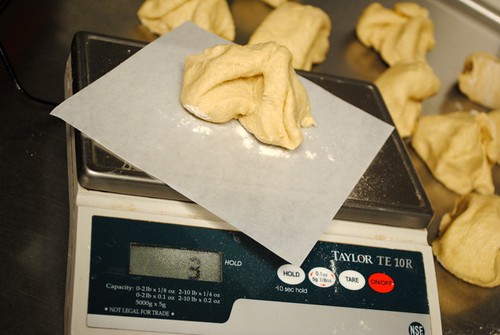
Lucky for me, Elaine said yes; partially because we had developed a relationship while I was writing the article and had become friends since then. If you already have a good relationship with a chef then that might be the best advantage you have to landing a truly great interning experience.
Elaine vetted me when I also asked the head chef, the restaurant manager, and the restaurant owner for permission as well and who all had to give their approval. I had to explain to each why I wanted to intern and what my goals were. After a few e-mails they all agreed to let me on, but in return I would work with their Public Relations person as well as write some blog posts and magazine articles chronicling my experiences. I was happy to do this because I got to do more writing in other publications that I had not yet been able to access, and the restaurant was happy for the publicity.
Right from the start I was up-front about what my goals and qualifications were. I explained that, while I hadn’t gone to cooking school, I was well-experienced and had a lot of skills for a self-taught baker. I told them that I was smart and learned fast. I provided a resume along with recipes and writings that best sampled my work. I wanted to be sure they knew exactly what they were getting.
Similarly, I was sure to ask what their expectations of me were. Honesty and straightforwardness was the most important part of this exchange. Unlike other job interviews where you might be able to flub how many words a minute you can type, in a kitchen you either know how to make caramel or you don't. However, don't fret about what you don't know. The chef in charge who has taken you on realizes that the main reason you are there is to learn.
I was also a special case for Grange in that I was their first non-cooking school intern. Normally, cooking schools have a special insurance policy that covers students in case of injuries on the job. I had to ensure that I had health insurance and that, yes, I acknowledged that I could seriously injure myself while on the job. Keep in mind that some restaurants may not be to keen on accepting a non-student applicant for this reason as they could be liable.

Remember in your conversations with the chef/owner/whoever you’re talking to that they do not owe you anything. They see plenty of chefs who are more trained than you asking for internships, and who are also willing to work for free in the eventual hopes of a job. Be humble, truthful, and sincere in your approach and demonstrate why that chef or that restaurant is the only one in the world that you can see yourself learning at. That statement isn’t simply exaggeration. It should be the truth.
Lastly, do not think that any place is too far out of your reach. Just ask. The worst thing any place can do is say no. If they do then ask next week, the week after that, and so on. Don't give up! If they consistently say no and assure you that they really are not interested in an intern thank them for their time and begin your search again. (Don't burn bridges. The situation could always change in the future!)
What was your experience like?
My experience was pretty much all I wanted it to be and a lot more I didn't expect it to be. More, actually, is a great way to describe it. The people were way more fun than I anticipated. The work was more fun and much harder that I thought it would be.
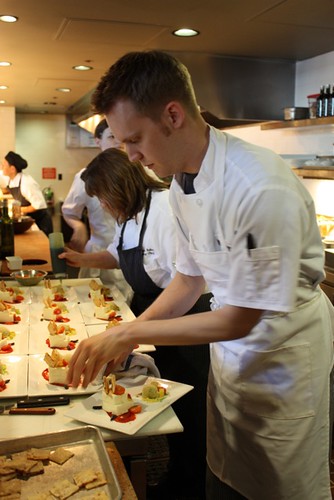
I also learned more than I expected; in the first week I experienced everything I was hoping to and many things I didn't think I would, like working the line on one of the busiest days the restaurant had ever encountered that year (I was there to plate dessert, but ended up learning how to move fluidly on the line while learning how to cook everything on the appetizer and small plate menu).
Chefs and cooks from both the banquet and kitchen side of things were happy to share with me, the pastry newbie, their knowledge about whatever they were working on. I learned all manner of skills such as how to fillet a sturgeon to how to easily plate for a 300 person event. All of this I've taken home and learned to incorporate in my everyday cooking.
I learned more about dedication, hard work, and people. Not just who they are, but what motivates them. Most importantly, I realized what motivated me.
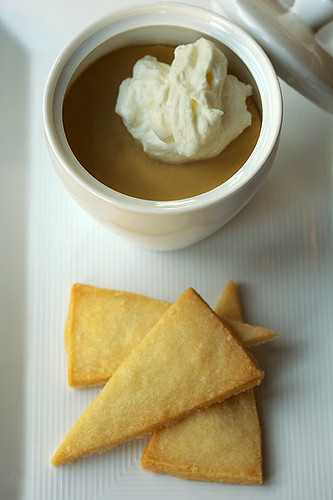
One of the best aspects of my internship was the visceral experience of really working with my hands. I never knew that they could do some of the things I was doing. I didn't know they would learn how to really wield a knife. I didn't know they could become so immune to small burns and cuts. Coming from an office world my work usually went into the ether without me really seeing results. Here there was a physical product. Tangible proof of my labor. Even better, I could see on people's faces when they ate what I had made their joy and satisfaction.
I loved my experience. It's what happens when you surround yourself with great teachers.
What happened after?
Afterwards, I went back to my office job. It was a very hard transition, just as it had been when I first arrived at the kitchen, but I had trouble really getting back into the swing of things. I actually found myself getting somewhat depressed. It was only after sitting with some other food blogging friends that I realized that after my taste of cooking I wanted more.
When someone asked me about how my job was going, I didn't expect what I said to come out: "I don't like it anymore. I'm not happy. I want to go back to cooking. I want more time to work on my writing."
So, there it was.

The next day I started looking for baking jobs. (Grange, sadly, had no openings.) I decided I would try to bake part time and use the rest of the time to see if I could make a real go at food writing as well. I realized this meant a loss of some benefits and a pay cut, but then again I saw my options as being comfortable and unhappy, or stable and happy. I chose the latter.
Recently, I found a baking job that has a lot of opportunity for creativity, growth, and the chance to work with an amazing chef and an enthusiastic manager and owner. In addition, I've lined up a lot of writing jobs in my queue and can't wait to start on them.
My experience taught me to simply go after what makes you happy.
I encourage you to give it a shot. I went into my internship with no intention of becoming a professional baker of any kind. I simply wanted to better my pastry skills and take a vacation from my everyday life. Yet, in it I found a work I truly love doing.
Other Posts About Cooking School and Internships
Should I Go To Culinary School? - Shuna Lydon
Should You Go To Cooking School? - David Lebovitz
Want to Go to Pastry School? - Anita Chu
So You Wanna Be a Chef? - Anthony Bourdain, via Michael Ruhlman
Special thanks to Ashlee Gadd and Jackie Phongsavath who took some of these photos.









thanks for this post! i may be interested in doing something like this in the future, sounds like a great experience!
ReplyDeleteSo excited for you! Finding your passion makes life grand. However, will miss you if or when your life becomes too full to blog! CP
ReplyDeleteThis is without a doubt my favorite of your blog articles. I am so happy to see you blossom in this way, and follow your bliss. You will never regret it.
ReplyDeleteI don't think I've ever commented before, but I've been reading for years and every time you mentioned that you worked in an office it just didn't seem to fit. This was a fantastic post to read, and congratulations on the new job!
ReplyDeleteI wish you all the best! I look forward to reading about your future adventures!
ReplyDeleteblissful baker: Best of luck to you! You should go for it!
ReplyDeleteAnnonymous: Never gonna happen. ;)
Andrea: Aww, thanks. I appreciate that and the support. =)
Laurel: Glad you did comment. And thank you for the congrats.
Reba: I look forward to reporting them!
I am glad to hear that you have found what makes you happy and that you took the leap into it!! Many people (myself included) never take the chance or just cant seem to figure it out! Best of luck to you and I look forward to reading about your bakinf adventures!!!
ReplyDeleteMy goodness -- congratulations Garrett! : ) It's fun to see that you began with cupcakes, and are now cycling through them again. I hope you LOVE your job, and I am so envious of your courage to make the leap -- go you!
ReplyDeleteThis is a wonderfully informative post! I kind of fell into my internship opportunity through a family member but would never have known how to go about actually finding one had I not already known someone in the industry. I have also been struggling with the decision to quit my day job and get one in a bakery. I'm currently working towards completing a part-time pastry program and hope that by the end I'll figure out an answer. But in the meantime, it sure is going to be a sweet ride!
ReplyDeleteOnce I started, I began to read up more on the subject and pouring through cookbooks...
ReplyDeleteJust started reading your blog and it looks like great fun, but the expression is PORING--not "pouring"--over something. Unless, of course you really are literally drenching your books in liquids...you can look it up. :)
Annonymous: Ack. Thanks for catching that. I always fear missing something when I proofread a post this big. Thank goodness for spelling/grammar aware readers!
ReplyDeletewhat an awesome post, so inspiring to read (bleary eyed and drinking my first cup of coffee)... congratulations dude!
ReplyDeleteYay! What a fantastic post! I recently quit my job as well, and have been toying with the idea of doing a pastry internship. Time has been my biggest obstacle as I've been busier than I was when I was working my day job, but this has definitely renewed my interested.
ReplyDeleteThanks for giving me the scoop. Hopefully soon when my life slows down (does that ever happen?) I'll pursue one. Thanks!
what a fabulously, inspirational post! i have often thought of doing exactly what you have done. you have encouraged me to "go for it". thank you!
ReplyDeleteMy experience taught me to simply go after what makes you happy. I truer statement would be hard to come by.
ReplyDeleteThe best job to be in is one that you are passionate of. Although this is the first time I am reading your blog, I am so happy for you:D
ReplyDeleteThanks for sharing this.
ReplyDeleteAll the best on the new job Garrett! Takes courage and shedloads of determination to do what you've done. Thanks for sharing - an inspiring reminder that it is really possible to have the life you want.
ReplyDeleteCool! Good luck with the new job! Very jealous but unfortunately I have a giant mortgage to pay for the moment!
ReplyDeleteOne piece of advice I'd add is that you should be prepared to do anything. Sometimes you might be washing dishes or something else you dont necessarily love, but as the bottom rung of the kitchen ladder it helps to show willing.
Also, I agree that an internship program through college can help as you'll have learned some of the ropes of kitchens and you'll be insured...
you've come a long way since 2006's cupcake attempts. congrats!
ReplyDeleteBeautiful dishes. I love the way you decorate the plate. Good job!
ReplyDelete